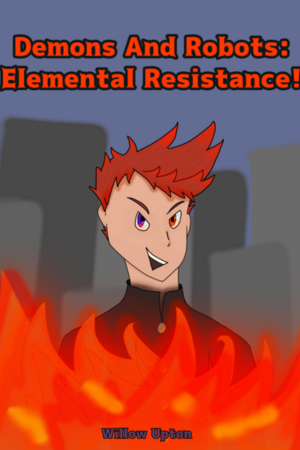Chapter 3:
The Descent Arc: Echoes of Resistance
Mechs of a Broken World: Sinks of War
The battlefield was a graveyard of steel and smoke.
Once-proud defense lines had collapsed into disarray, leaving nothing but fractured pavement and the twitching remains of fallen mechs. Acid rain hissed as it ate through armor plating, mingling with the choking black smoke that billowed from ruptured fuel cells and broken turbines. Amid it all, one mech limped through a ruined alley—our POV. His frame shuddered with each step, a jagged gash in his side leaking hydraulic fluid like blood.
His targeting system flickered. With a weak whine, he raised his arm cannon and fired. The blast veered wide, missing its mark by meters.
A blur of movement—then a sink burst from the shadows, claws gleaming with corrosive spit. The mech barely had time to react. He dropped low, ducking under the attack, then rolled clumsily on one shoulder. The maneuver ended in a jarring crash as he slammed into the beast with the full weight of his metal frame. The sink crumpled against a cracked wall—but at a cost. The mech's right arm spasmed, then dropped uselessly to his side.
Gritting through system alarms, he struggled to rise. A second sink skittered into view, this one faster, twitching erratically with every step. The mech’s interface blinked red. Warnings screamed across his HUD.
No escape. No backup.
He dug his feet into the fractured street and braced for one last stand.
The sink leapt.
And then—it was gone.
A black blur sliced through the air, and the sink split mid-flight, severed cleanly in half before it even knew what hit it. The mech dropped to one knee, stunned, his processors trying to make sense of what just happened. He looked up.
Towering above him stood a figure of perfect symmetry and silent menace. Jet-black armor shimmered like liquid obsidian, light pulsing softly from seams etched into its form. Its head was smooth, featureless—save for a single glowing eye embedded in the center, like the lens of an ancient cinema camera. The eye narrowed slightly as it scanned the battlefield.
An Obsidian.
Then came more.
Five. Ten. Twenty.
They emerged from the smoke like specters, identical in form and motion, gliding across the broken streets with inhuman grace. Where chaos had reigned only moments ago, order returned in the most brutal form imaginable. The Obsidians didn’t fight like the others. They didn’t scream or shout or hesitate. They moved as one—fluid, efficient, unstoppable.
One leapt over a lunging sink, twisted mid-air, and landed behind it without a sound. A blade-like appendage jutted from its forearm and plunged into the creature’s back. The Obsidian tossed the corpse aside like discarded debris, already moving to the next threat.
Nearby, a young mech—barely operational—struggled beneath a collapsed wall. An Obsidian dropped beside him, lifting the rubble with one hand. With the other, it pulled the mech free and stood, offering no acknowledgment or gesture. Just action. Then it was gone, vanished into the next skirmish.
Another extended its arm. A shimmering dome of light burst forth, shielding a cluster of wounded mechs. Sinks hurled themselves at the barrier but were repelled with sparks and shrieks of frustration. Inside, the survivors took a moment to breathe—to hope.
The POV mech, still resting against a scorched vehicle, watched in disbelief as the tide turned. For the first time in what felt like hours, they were not just surviving. They were winning.
Then the clouds above began to churn.
A thunderous rumble echoed across the city as something massive descended through the storm. Every head turned—Obsidians included. A shadow took form, and when it landed, the earth split with a seismic crack.
The Titan Mech had arrived.
Five times the height of the towering Obsidians, the Titan Mech was a colossal machine of raw energy and ancient power. Its body pulsed with light, each step a declaration of supremacy. It lifted one immense foot—and crushed a swarm of sinks beneath it in a single, shattering stomp.
The Obsidians parted.
Without a word, the Titan strode forward, its massive fists clenched. Then it charged—plowing through the enemy like a god made flesh and steel. Sinks exploded under its punches. Buildings trembled in its wake.
The POV mech could only watch, awestruck, as machine and machine fought side by side in eerie silence. The battlefield, moments ago lost, was now a stage for retribution.
From the shadows, a roar erupted—long, high-pitched, furious.
A Sink Queen emerged.
She rose from the depths of the city like a nightmare, massive and multi-limbed, her crown of bone glistening in the acid rain. The Obsidians turned in unison, weapons raised. The Titan broke into a sprint.
Their clash was catastrophic.
The Titan slammed its fists into the queen’s face, sending her reeling. Obsidians swarmed her sides, unleashing synchronized bursts of energy. Acid spewed in a furious wave, melting debris and striking several defenders—but the Obsidians held. Their armor shimmered, reformed, and they pushed forward.
The queen lashed out—but the Titan was faster. It leapt, bringing both fists down into her chest. The ground shook. She stumbled, roared, flailed.
But she was losing.
All around them, the surviving mechs rallied, inspired by the impossible. The Obsidians cleared the path. The Titan broke it open. Together, they surged.
The queen turned to flee.
The Titan grabbed her by the neck.
With brutal force, it slammed her into the ground. One Obsidian leapt onto her back, planted a core charge, and dove away. The explosion tore through her spine. The queen screamed, convulsed—then lay still.
Silence.
The battlefield froze.
The mechs—what few remained—looked around, unsure if it was real. From the brink of extinction to dominance in a matter of minutes. The Obsidians stood still, surrounding the corpse of the queen, their glowing eyes unblinking.
Then the Titan raised an arm.
It pointed—not to the sky, but forward. Deeper into the smoke, into the unknown heart of the city.
The war wasn’t over. But now... it was turning.
The POV mech slumped against the wall, damaged but alive. He watched the Obsidians follow the Titan, marching silently into the rubble, into whatever came next.
They weren’t just backup.
They were the reason hope still lived.
The corridor was dying.
Collapsed beams jutted at crooked angles, and the air shimmered with the acidic mist of ruptured pipes and bio-corrosion. Steam hissed from the walls, mixing with the flicker of broken lights. A lone mech—scarred, battle-worn, and barely functional—dragged himself through the debris-choked hallway. One arm hung useless. Acid hissed on his shoulder plating, melting into the core.
His internal systems screamed. HUD warnings flashed like a strobe: Power critical. Armor compromised. Core containment weakening. Sparks sputtered from exposed circuits as he forced one more step forward, then another.
Clicking. Soft at first. Then louder. Then all around.
They were coming.
From vents and ceiling grates, from fractured walls and flooded ducts, the Sinks emerged—dripping with ooze, limbs skittering across steel. Their claws tapped a rhythm of hunger as they encircled their prey. Eyes like coals locked on him. He raised his weapon. Fired. A dim, sputtering blast shot forward. It barely singed the first creature’s carapace.
The pack surged.
One launched through the air, claws poised for his chest. The mech caught it mid-leap and slammed it into the ground, hard enough to leave a dent in the metal. Another landed on his back. He staggered. Then collapsed. Acid claws dug deep into his backplate, slicing toward the core.
He screamed into the comms—raw, glitching audio. A desperate signal sent into silence. No one responded. The line was dead. The mission was over. He was alone.
And just before the killing blow landed—
Everything went black.
High above the carnage, perched like a sentinel, stood another figure. It didn’t breathe. It didn’t tremble. It simply watched.
The Cinema Mech observed from a rusted girder, still as stone. Its dome-shaped head—a smooth, curved structure with a single glowing lens—rotated in steady, methodical arcs. Below, the scene unfolded in infrared and motion overlays: the fallen mech, the Sink swarm, the corpse-strewn corridor.
No emotion. Only data.
Then the mech moved.
With a fluid leap, it dropped from its perch. Metal screamed as it landed, sending a shockwave through the floor. A support beam shattered beside it and crashed into the swarm, crushing several Sinks beneath twisted steel.
The remaining creatures shrieked and scattered—startled.
The Cinema Mech advanced with eerie grace, sliding between pipes and shadows, its limbs bending with insect-like agility. It didn’t speak. It recorded. It catalogued. Everything it saw became part of its expanding archive. Enemy patterns. Power signatures. Tunnel layouts. The fallen.
In a narrow chamber above, it extended a hand to an exposed panel. A relay activated.
A pale-blue holographic map shimmered into view, outlining the underground base like a skeletal labyrinth. Deep within the lowest layers pulsed a single red signal. A long-lost signature, faint but unmistakable.
The Cinema Mech transmitted the data.
Miles above, a satellite caught the burst. Inside the forward command post, alarms sounded. Officers leaned over glowing screens, eyes widening.
“That’s not possible,” one whispered.
The lead officer barked, “Divert forces. The Titan is in the base!”
The Cinema Mech ran.
Not blindly—deliberately. Its path was calculated, slicing through shortcuts and vent shafts. Then, ahead, a problem. A cluster of hybrid Sinks blocked the hall. These were no ordinary creatures—twisted flesh merged with jagged metal. Experimentation gone wrong.
The Cinema Mech didn’t pause.
It vaulted upward, spinning onto the ceiling. The hybrids lunged and missed as the mech twisted through a flurry of limbs. Then, mid-roll, it unleashed a high-frequency sonic burst.
The creatures dropped instantly, writhing. Their balance failed. Their implants sparked and died. The Cinema Mech touched down and continued, unfazed.
In another tunnel, five broken mechs lay slumped in a pile. Armor melted. Faces unrecognizable.
The Cinema Mech slowed. Bowed its head for a brief moment. Recorded their IDs. Then kept moving.
A crack sounded beneath its feet.
Before it could react, the floor gave way, and it plummeted into darkness.
It landed in silence.
The chamber was enormous. Lined with hundreds of organic pods—each one pulsing faintly, twitching like muscles beneath translucent skin. The mech froze.
Any movement would wake them.
Slowly, one arm lifted. A cloaking field shimmered into place, and the Cinema Mech vanished into visual distortion.
Seconds stretched. One pod cracked. Another twitched violently. Heat signatures flared on thermal sensors. But the Cinema Mech remained motionless.
Eventually, the pulses slowed. The heat faded.
Safe—for now.
The cloak dropped, and the mech sprinted out of the chamber. Time was against it. As it moved, it sent coded pulses into the dark.
Across the base, scattered survivors stirred.
Low-power beacons blinked in their HUDs—signals long since abandoned by most modern units.
One mech, dragging himself from a collapsed stairwell, whispered in disbelief, “Cinema Mech…”
“They only activate in emergencies.”
Others rose. Limped. Followed the signal.
High above, in fractured slabs of ceiling, glowing eyes watched. The Obsidians—giants clad in silence—had not yet descended into the base. But they waited. A quiet promise of power held in reserve.
The Cinema Mech pushed forward.
Finally, it arrived. A massive door loomed ahead, half-buried in rubble. Ancient. Thick.
Its scanners confirmed the impossible. Behind the steel and stone…
A living signature.
Titan Mech.
Alive.
The Cinema Mech extended both arms. Rubble shifted. Steel groaned.
And the digging began.
PART 3: The Unseen Corridor
The Cinema Mech stood motionless before the sealed door, its single glowing lens reflecting the warped metal. Debris had melted and fused against the frame, sealing it shut with layers of acid-scorched ruin. It wasn’t just old damage—it was reinforced. Deliberate. Whatever was inside hadn’t been meant to come out.
It scanned the door again. No response. But just beneath the surface, like a slow heartbeat pulsing through layers of steel and sinew, faint life signs glowed.
Footsteps echoed down the ruined corridor. One by one, mechs emerged—some dragging damaged limbs, others smeared with coolant and acid burns. Survivors. Stragglers from other squads, pulled here by the beacon the Cinema Mech had activated. None of them spoke. They didn’t need to. They simply looked at the door, then at each other.
Most didn’t know what waited beyond it. Some whispered theories—sink nest, weapons vault, command cache—but the Cinema Mech said nothing. It never spoke. It only raised one hand, pointing upward through the wrecked ceiling. Reinforcements would be needed.
Far above, the battle for the surface raged. Explosions rippled across ruined buildings. Jet fighters screamed across the sky, launching targeted strikes on sink formations to draw attention away from the underground. Between the blasts, the silhouettes of Obsidians held firm at the outer perimeter, unmoving, unshaken, towers of silent armor.
Below, the survivors began to prepare.
Some lined the corridor with sonic charges, wedging them carefully into gaps in the debris. Others moved to flank positions, scanning tunnels and vents. The Cinema Mech walked slowly along the edge of the door, recording microfractures, vibration patterns, pulse rhythms. The air grew warmer. Wet. Acid dripped from cracks above, hissing on metal. Something deeper in the base was awake.
A low rumble, then—
Collapse.
The tunnel behind them imploded with a violent roar as a massive shape burst through. The Sink Behemoth was grotesque—bloated, its body stretched with fused muscle and armored plates. Chitinous jaws dripped acid, and its back pulsed with glowing sacs. It roared, and the walls shook.
Weapons fired. The corridor exploded in light. The survivors scattered—some diving behind debris, others unloading plasma bursts into its hide. The Cinema Mech didn’t flinch. It ducked under a falling pipe, slid between rubble, and activated Wave Split mode. Twin blades extended from its arms, vibrating at subsonic frequency. With fluid grace, it sliced through grasping limbs and twisted spines.
Three mechs were caught in the charge—crushed instantly, their bodies hurled against the sealed door like discarded parts. The Cinema Mech spun midair and activated Frequency Overload. A shockwave pulsed from its core, disrupting the Behemoth’s senses. The monster staggered—but not enough.
Above, a shaft of light cracked through the ceiling.
And from it, two titans dropped.
The Obsidians hit the ground with a sound like thunder. One deployed a wide-angle sonic barrier, shielding the survivors. The other opened fire—heavy pulse cannons lighting the dark with each concussive blast. They didn’t speak. They didn’t hesitate.
The survivors regrouped. Dragging injured comrades out of the Behemoth’s path, they formed a wedge around the Cinema Mech. It had already leapt onto the creature’s back, slicing into its spine, searching for the joint cluster between its plated shoulders. Sparks flew.
From the flanks, a new wave arrived—smaller sink variants, acid spitters with chattering jaws and twitching mandibles. The second Obsidian shifted to defensive stance, absorbing their barrage. The Cinema Mech dropped from the Behemoth’s back and flashed a command gesture.
Push.
They did.
Coordinated plasma fire ripped into the Behemoth’s midsection. It stumbled, screamed—a grotesque, gurgling howl. Then the first Obsidian launched a grappling wire, looped it around the beast’s torso, and yanked. The Behemoth was pulled sideways—straight into a ruptured pipeline.
The impact shattered the pipe. Fire exploded. Steam. Collapse.
Silence.
Then: breathing. Mechanical. Labored. The survivors turned.
The door still stood.
Scorched. Buckled.
The charges were ready.
The Cinema Mech stepped forward and nodded once.
BOOM.
A deafening blast rocked the corridor. Metal screamed as the reinforced door split and buckled inward. Dust and smoke poured from the chamber beyond—thick and heavy, like the breath of something ancient.
Inside, shadows moved.
A colossal figure loomed in the darkness. Limbs the size of towers, slumped forward. Bound by layers of living sinew. Plates cracked, exposed circuits glowing like old embers. It didn’t move—but it breathed. The Titan Mech.
The survivors stepped inside slowly. Their lights cut through the haze. No one spoke.
The Cinema Mech approached first. Its scanners confirmed the impossible: the Titan was alive, but dormant—held in forced stasis. One twitch of its arm. One flicker of its head. It knew they were there.
And the chamber… it wasn’t empty.
Around the perimeter, dozens of pods began to glow. Red. Pulsing. The walls quivered.
Then: movement.
Pods cracked open. Limbs unfolded. Sink defenders poured from the shadows—faster, smarter, biomechanical. Their bodies were lined with acid sprayers, their eyes glowing red with hive-link coordination. The ambush had been planned.
The mechs didn’t panic. They had no time to.
Weapons up. Formation locked.
The Obsidians moved first, stepping forward like shields. The Cinema Mech rushed toward the Titan, activating a command sequence on its arm. Sound pulses vibrated outward—focused frequencies meant to destabilize the sinew bindings. The process began.
The defenders charged.
The chamber erupted in chaos. Lasers cut through fog. Mechs screamed. Acid sprayed across metal. The Cinema Mech took a hit to the shoulder—plating bubbled and hissed, exposing inner coils. It didn’t stop. It kept firing the signal.
The Titan flinched.
Its fingers twitched.
Its torso shifted.
Bindings snapped—one after another. The chamber rattled. Sink defenders shrieked and lunged toward the Cinema Mech, but were intercepted midair by the Obsidians. Still it held the signal, even as its systems began to overload.
Then—
White light.
The Titan Mech’s eyes snapped open.
Blinding. Focused. Alive.
Its head turned toward the battlefield.
And the war began again.
TO BE CONTINUED



Please sign in to leave a comment.